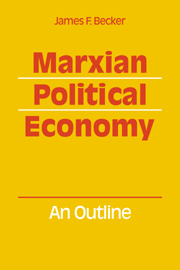Book contents
- Frontmatter
- Contents
- Acknowledgments
- Introduction
- PART ONE THE REPRODUCTION SCHEMES
- PART TWO THE LABOR THEORY OF VALUE
- PART THREE RELATIONSHIPS BETWEEN PRICES AND VALUES
- 7 Unequal exchange: price-value relations, irregularity, and instability
- 8 Accumulation in the advanced capitalism: the nature of the crisis
- 9 Marx's first and second approximations to the evolution of class structure
- PART FOUR THE DEVELOPMENT OF CLASS STRUCTURE AND RELATIONSHIPS
- Notes
- Index
8 - Accumulation in the advanced capitalism: the nature of the crisis
Published online by Cambridge University Press: 07 October 2011
- Frontmatter
- Contents
- Acknowledgments
- Introduction
- PART ONE THE REPRODUCTION SCHEMES
- PART TWO THE LABOR THEORY OF VALUE
- PART THREE RELATIONSHIPS BETWEEN PRICES AND VALUES
- 7 Unequal exchange: price-value relations, irregularity, and instability
- 8 Accumulation in the advanced capitalism: the nature of the crisis
- 9 Marx's first and second approximations to the evolution of class structure
- PART FOUR THE DEVELOPMENT OF CLASS STRUCTURE AND RELATIONSHIPS
- Notes
- Index
Summary
The developmental sequence: the first and second phases
Despite an appearance of relative stability in the years immediately following World War II, the unevenness and instability of accumulation remain what they have always been: reflections of contradictions embedded within the apparatus of industrial and circulatory accumulation, contradictions that culminate in economic breakdown and whatever may follow from that. To be sure, in the course of irregular advances the underlying situation gradually alters; times change, and with them come changes in the form of the crisis. As capital accumulates through successive phases, the laws of motion work ever more decisively and powerfully in the promotion of economic exhaustion, of an inability to continue the vital work of developing further the productive forces. In the end, even in periods of activity, the swimmer treads water rather than move against the current. The struggle begins then in earnest for a socialist release from an increasingly intolerable predicament.
But, as always, in order to see a complicated present one must return to the past for understanding. In order to perceive correctly the manner of working of laws of motion in the present phase, one must consider what has previously been. In contemplating the events of the post – World War II period, one must return to the historical setting that throws into proper relief the real character of the phase in which current events are taking place.
- Type
- Chapter
- Information
- Marxian Political EconomyAn outline, pp. 181 - 202Publisher: Cambridge University PressPrint publication year: 1977

